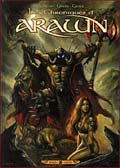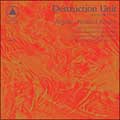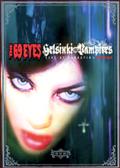ENTROPIA (FRA) - Obscure Rising (2010)

Label : Auto-Production
Sortie du Scud : février 2010
Pays : France
Genre : Death Metal Lyrique
Type : Démo
Playtime : 6 Titres - 15 Mins
ENTROPIA en un groupe formé en 2006. La même année, il sort son premier album, From Chaos Born. 2008 voyait une démo quatre titres émerger : The Dark Pages. Voulant respecter la tradition des deux années entre chaque production, le groupe attendit donc 2010 pour sortir un six titres, Obscure Rising. Composé de quatre membres (une chanteuse, un guitariste, un bassiste et un batteur), le groupe compte bien ainsi se faire de nouveaux adeptes.
Malgré le fait qu’elle soit autoproduite, cette démo est quand même de bonne qualité. Seulement, on peut noter tout de même quelques problèmes : les claviers, quand il y en a, écrasent presque tout ; la batterie est trop en retrait, tout comme certains passages de guitares ; seule la voie de Marie bénéficie d’un traitement de faveur pour être toujours parfaitement audible. Après, on peut aussi se demander où se trouve la basse. On ne l’entend jamais et même sur un passage épuré, comme sur « Phantom Pain », on ne sait pas qu’elle est présente. Musicalement, le groupe ne reste pas dans les canons du Metal avec une chanteuse qui se fait parfois lyrique, bien au contraire. Les incursions dans le Black (« Sweet Little Sin ») côtoient une prédominance Death. « Sister Of Obscurity » s’essaye même à un Heavy Epique puissant. Le groupe, loin de singer les anciens, essaye de trouver son propre univers, ce qui est une bonne chose. Après, je pense aussi qu’il faudrait qu’il se limite à ce qu’il sait jouer. Il y a certains passages qui semblent un peu approximatifs, comme la double sur le début de « Phantom Pain » (d’ailleurs, c’est étonnant quand on voit qu’elle est très bien tenue sur « Sister Of Obscurity ») ou encore la synchronisation entre guitare et batterie sur « Astral Cathedral ».
ENTROPIA a de bonnes cartes en main. Je pense seulement qu’il veut peut-être trop en faire quitte à manquer un peu de précision. Personnellement, j’aurais préféré plus de retenue par moment pour une plus grande rigueur.
Ajouté : Jeudi 01 Juillet 2010
Chroniqueur : Wong Li
Score :   
Lien en relation: Entropia Website
Hits: 9674
|












